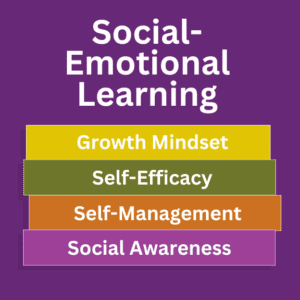
SEL
Working towards a holistic view of the student…
One of the opportunities afforded by a clean-sheet approach to education is the integration of a variety of tools that are otherwise difficult to fit in. One of these tools is Social-Emotional Well-being or SEL. Research has proven time and again that the social and emotional well-being of a student greatly affects academic performance. Therefore, in the presence of many effective tools of analysis, it behooves us to keep an eye on the social and emotional well-being of our students.
This has recently been made easier by the US Department of Education through grants to the California CORE Districts to develop open-source tools around SEL. One of these tools was built and tested across the four school districts in over 1200 schools with over 480,000 students. We have adapted that tool to zipline in a way that allows us to produce a new SEL score on each student after 9 days of participation in any aspect of our curriculum. If the student is active on zipline 5 days per week, the system will generate a new score every two weeks.
The zipline implementation of SEL consists of three phases: 1) scoring, 2) suggesting interventions, and 3) delivering interventions. As of the summer of 2024, we have crossed into phase 2 of our implementation. We hope to complete phase 2 during 2024 and begin working on phase 3 in 2025.
Significant analysis of the tool can be seen in the .pdf documents linked on this page.
For those interested in the nature of the questions asked by this tool, we present them here.
Social-Emotional: Self-Management
Please answer how often you did the following during the past 30 days. During the past 30 days…
-
How carefully did you listen to other people’s points of view?
-
How often did you compliment others’ accomplishments?
-
How well did you get along with students who are different from you?
-
How clearly were you able to describe your feelings?
-
When others disagreed with you, how respectful were you of their views?
(Almost Never, Once in a While, Sometimes, Often, Almost All the Time)
Social-Emotional: Growth Mindset
Please indicate how true each of the following statements is for you:
-
I can change my intelligence with hard work.
-
I can increase my intelligence by challenging myself.
-
I am capable of learning anything.
-
I can do well in a subject even if I am not naturally good at it.
(Almost Never, Once in a While, Sometimes, Often, Almost All the Time)
Social-Emotional: Self-Efficacy
How confident are you about the following at school?
-
I can earn an A in my classes.
-
I can do well on all my tests, even when they’re difficult.
-
I can master the hardest topics in my classes.
-
I can meet all the learning goals my teachers set.
(Almost Never, Once in a While, Sometimes, Often, Almost All the Time)
Social-Emotional: Social Awareness
-
How carefully did you listen to other people’s points of view?
Not Carefully At All, Slightly Carefully, Somewhat Carefully, Quite Carefully, Extremely Carefully
-
How often did you compliment others’ accomplishments?
Almost Never, Once in a while, Sometimes, Often, Almost all the time
-
How well did you get along with students who are different from you?
Did Not Get Along At All, Got Along A Little Bit, Got Along Somewhat, Got Along Pretty Well, Got Along Extremely Well
-
How clearly were you able to describe your feelings?
Not At All Clearly, Slightly Clearly, Somewhat Clearly, Quite Clearly, Extremely Clearly
-
When others disagreed with you, how respectful were you of their views?
Not At All Respectful, Slightly Respectful, Somewhat Respectful, Quite Respectful, Extremely Respectful
The data produced by the Zipline SEL tool is available to school employees with the role of administrator in the Zipline admin system.

SEL Validity
Measuring Social-Emotional Learning Through Student Surveys in the CORE Districts: A Pragmatic Approach to
Validity and Reliability

SEL Best Practices
Measuring Social Emotional: Learning Best Practices and Lessons Learned for SEL Assessment

SEL Metrics
Download this CORE districts’ study to discover a method for assessing and developing social-emotional skills that are essential for student success in college, career, and life.

















